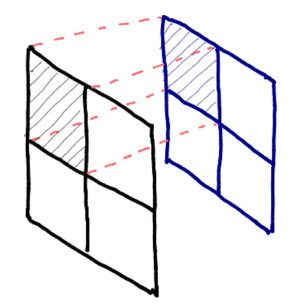Image to image automatic co-registration processing Qgis plugin. This plugin uses AROSICS to perform automatic subpixel co-registration of image datasets based on an image matching approach working in the frequency domain.
This plugin has four algorithms:
This Qgis processing generates a new raster file base on the target image with all properties from the reference image. This process don't check the content of the pixel, this process adjusts the target image to the closest pixel alignment based on the reference image. The basic pixel alignment process include:
- Reprojection (only if needed)
- Resampling (only if pixel sizes are different)
- Extent/bounds adjustment
For a real image to image co-registration use the following two algorithms instead
The Pixel Panning Adjustment algorithm provides a simple way to manually shift pixels in the X (longitude) and Y (latitude) directions in the whole image given by the user. This algorithm is not automatic, the user must select the pixel shift in X and Y.
Detects and corrects global and local X/Y shifts misregistrations between two input images in the subpixel scale using the content of the pixels in the matching window. Perform automatic subpixel co-registration of image datasets based on an image matching approach working in the frequency domain, combined with a multistage workflow for effective detection of false-positives [1].
It is designed to robustly handle the typical difficulties of multi-sensoral/multi-temporal images. Clouds are automatically handled by the implemented outlier detection algorithms [1].
This global algorithm is useful when the target image requires just one shifts in distance and direction in the whole image.
This local algorithm is useful when the target image requires different pixel shifts in distances and directions. The precision of this is based on mainly in two input parameters: tie point grid resolution and matching window size. This is significantly more comprehensive and slower than global algorithm.
*[1] These algorithms use AROSICS software developed by Daniel Scheffler, for more info url and paper.
The plugin can be installed using the QGIS Plugin Manager, go into Qgis to Plugins menu and Manage and install plugins, in All section search for Coregistration.
The plugin will be available in the Processing Toolbox or you can search and open it directly from the Statusbar.
Dependencies: This plugin requires additional Python packages (
AROSICSand its dependencies), that are generally not part of QGIS's Python.
For Windows users download and install the plugin using the zip Coregistration_all_in_one_win.zip in releases (alternative link) with all the libs and dependencies inside. This should work directly without any additional steps with a Qgis version >= 3.18 on a 64bit Windows system, if you have issues with this try with the alternative installation below.
Note: For uninstall/update this plugin using this all-in-one in Windows, you must first deactivate, restart Qgis, uninstall/update it and finally activate it again.
The plugin try to install all the dependencies for you in a local folder automatically in the installation process. If you want to minimize the local installation of dependencies of this plugin or fix dependency issues, a good idea is before install the plugin, install the following packages in your system: matplotlib, cartopy, geopandas, plotly, scikit-image
If you have problems with the dependencies, the best options to solve it is use conda and install AROSICS and Qgis (from the conda shell):
conda install -c conda-forge arosics qgisAfter that open Qgis from the shell with qgis command. Then install the plugin.
The official version control system repository of the plugin: https://github.com/SMByC/Coregistration-Qgis-processing
Issues, ideas and enhancements: https://github.com/SMByC/Coregistration-Qgis-processing/issues
This plugin is a free/libre software and is licensed under the GNU General Public License.
